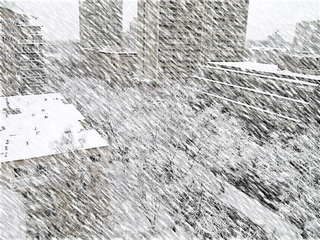The Importance of Artistic Disasters

Lately I’ve been infatuated with disaster and end of the world movies. Mainstream, direct-to-video, TV miniseries – anything will do. So I’ve watched The Triangle, Revelations, War of the Worlds, Category 7 and, most recently, Absolute Zero. Now, most movie reviewers will tell you to never put a title on your film that can come back and be used against you. First strike against Absolute Zero. This movie is essentially a low-budget attempt to repeat the moderate success of The Day After Tomorrow. But there’s only so much you can do to make globally destructive weather effects for the price of a bad coffee. So the film, despite an interesting premise (scientifically speaking), just never had a chance from a financial point of view.
So don’t get me wrong – this isn’t a movie that fails because of utter incompetence. When it fails, it fails by inches (which might as well be miles). We’re talking about dialogue that is reasonable, but not memorable. The plot is serviceable, but not compelling. The effects are mostly okay, but few and far between. The acting is not flawed. But add up all of these things and you have a real disaster artistically.
But - and I direct this to all would-be screenwriters and filmmakers out there – this is great news for you. It means you can sit and watch a film and constantly think about what you would have done differently. Even I, who’ve never made a film, noticed things like establishing shots that were a beat too long. And there were emotionally unsatisfying moments such as when a key character dies (impaled by a palm tree in the least effective effect of the movie) and his loved ones look a wee bit teary eyed for a few seconds and then promptly forget about him.
Going through a movie like this is much more educational in some ways than watching a truly great film. A great film can both fill you with wonder that such things are possible in the world and fill you with insecurity about you ever being able to equal or surpass what you’ve seen. You learn from great films and are influenced by them. But bad films can show you that you already have learned more than you thought. When you see something that doesn’t work and can say why, this helps build your sense of confidence and accomplishment (at least as someone who has some knowledge in the field). And sometimes a bad film will have one or two good ideas or techniques that you can redesign and adapt for your own work.
The same goes for poetry. When I’m feeling insecure about my own poems, I’ll sometimes take out a recent literary magazine that has never used any of my work and read some of the stuff they have published. This often makes me quite happy because I look at the poems so unlike mine that are, from my perspective, bad poems and this frees me up to write something new – gives me a false sense of superiority so essential to the artistic process (and so soon undermined by having to go back and do the rewrite and see the inspired poem in all its bare-assed awkwardness and glory).
There’s nothing to protect your work or mine from being treated exactly the same way by some other creative type, of course. Just so long as I never find out, I’m happy in my ignorance. What’s important is that we learn, just like the characters in disaster movies, how to pay attention to all the right signs of possible doom and we will not make the same mistakes that led to catastrophe.
0 Comments:
Post a Comment
<< Home